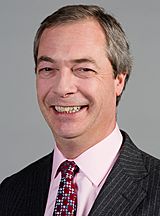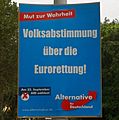Euroscepticism facts for kids

Euroscepticism is when people criticize or disagree with the European Union (EU). Some people also use this word to mean a complete rejection of the EU. It's important not to confuse Euroscepticism with Anti-Europeanism. Anti-Europeanism is a dislike or fear of European culture or people in general.
People who are Eurosceptic often believe that the European Union makes countries weaker. They also think the EU has too much bureaucracy. This means that many important decisions are made by officials who are not elected by the public. In 2016, countries like Greece, France, Spain, and the United Kingdom had many people who didn't like the EU.
The rise of certain political parties in Europe, often called "right-wing populist" parties, has been linked to their Eurosceptic ideas. A big example of this happened on June 23, 2016. The United Kingdom voted to leave the European Union. About 52% of people voted to leave.
Contents
What do polls say about the EU?
In November 2015, a survey showed that fewer people had a positive view of the EU. In 2007, 52% of people felt good about the EU, but this dropped to 37%. Distrust of the EU was highest in several countries. These included Greece (81%), Cyprus (72%), Austria (65%), France (65%), Germany (63%), the United Kingdom (63%), and the Czech Republic (63%).
Which political parties are Eurosceptic?
Many political parties across Europe have Eurosceptic views. Here are some of the main ones, listed by country:
|
|
|
Images for kids
-
Heinz-Christian Strache, former leader of the Austrian hard Eurosceptic party FPÖ.
-
Václav Klaus, former Eurosceptic President of the Czech Republic.
-
Pia Kjærsgaard; a member and former leader of the hard Eurosceptic party Danish People's Party. This party is one of the largest in the Danish parliament.
-
Marine Le Pen, a well-known French politician and former leader of the National Front (France).
-
"Referendum on saving the euro!" This poster is from the Alternative for Germany (AfD) party. It talks about Germany's money contributions during the Eurozone crisis.
-
Matteo Salvini with Eurosceptic economists Claudio Borghi Aquilini, Alberto Bagnai, and Antonio Maria Rinaldi during "No Euro Day" in Milan, 2013.
-
Geert Wilders, leader of the Party for Freedom. This is a strong Dutch Eurosceptic party.
-
Polish President Andrzej Duda, Polish Prime Minister Mateusz Morawiecki, and Jarosław Kaczyński, on April 9, 2018.
-
"Trumna dla rybaków" ("Coffin for fishermen"). This sign is seen on many Polish fishing boats. It shows a gesture of protest. Polish fishermen are protesting against the EU's ban on cod fishing for Polish ships.
-
Santiago Abascal, leader of Vox.
-
Russian President Vladimir Putin is openly Eurosceptic. He has promoted a different economic union with Armenia, Belarus, Kazakhstan, and Kyrgyzstan. This is called the Eurasian Economic Union.
-
Nigel Farage, former leader of UKIP and the Brexit Party. He is one of the most famous Eurosceptic figures in the UK.
See also
 In Spanish: Euroescepticismo para niños
In Spanish: Euroescepticismo para niños

















